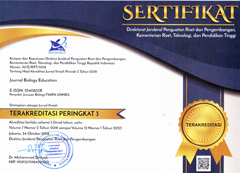Development of ICT Oriented Reproductive System Materials Learning Module for Training the High School Students’ Information Literature Skill
Abstract
The explosion of information that occurred due to advanced technology caused people to have information literacy skills. Information literacy skills are needed by students so that they are able to obtain accurate information from trusted sources. The purpose of this research was to develop the module and to find out the potential and to test the feasibility of the module in training information literacy to students. In this study, the Research and Development/R&D method based on Sugiyono’s theory of 2015 version was used with modifications. The method sequentially included the potential and problem stages, initial information collection, module design, module validation by experts, module revision phase I, trial use of small-scale modules, revision of phase II modules, and large-scale module trials. The trial design used a pre-experimental design method in the form of a one-shot case study. The module trial was carried out at SMAN 3 Tegal involving 9 students of class XI-MIPA 1 and SMAN 14 Semarang involving 30 students of class XI-MIPA 2. The data collected includes data on students' perceptions of the information literacy content in the module and data on the module's ability to practice information literacy through tasks/activities on the module. Data were collected through questionnaires and instruments in the form of assignments in the module. The data were analyzed quantitatively using the formula for the percentage of qualitative criteria. The results showed that the developed module was suitable to be used regarding the material expert assessment results that reached 96.87%, while the assessment of media experts was 95.24%, and the assessment of biology teachers was 99.62%. In addition, the student assessment data was obtained stating that the module could be used as a learning resource. Based on the data analysis of the potential of the module in training students' information literacy, it could be seen that in the small-scale trial, a percentage of 85.49% was obtained with the criteria of highly eligible, while in the large-scale trial, the percentage of 77.41% was obtained with the criteria of eligible. Thus, it could be concluded that the developed module was eligible to be used and it was able to train students' information literacy.
The copyright of the article once it is accepted for publication shall be assigned to the journal as the publisher. The intended copyright includes the right to publish the article in various forms (including reprints). The journal maintains the publishing rights to the published articles.
This work is licensed under a Creative Commons Attribution 4.0 International License.







